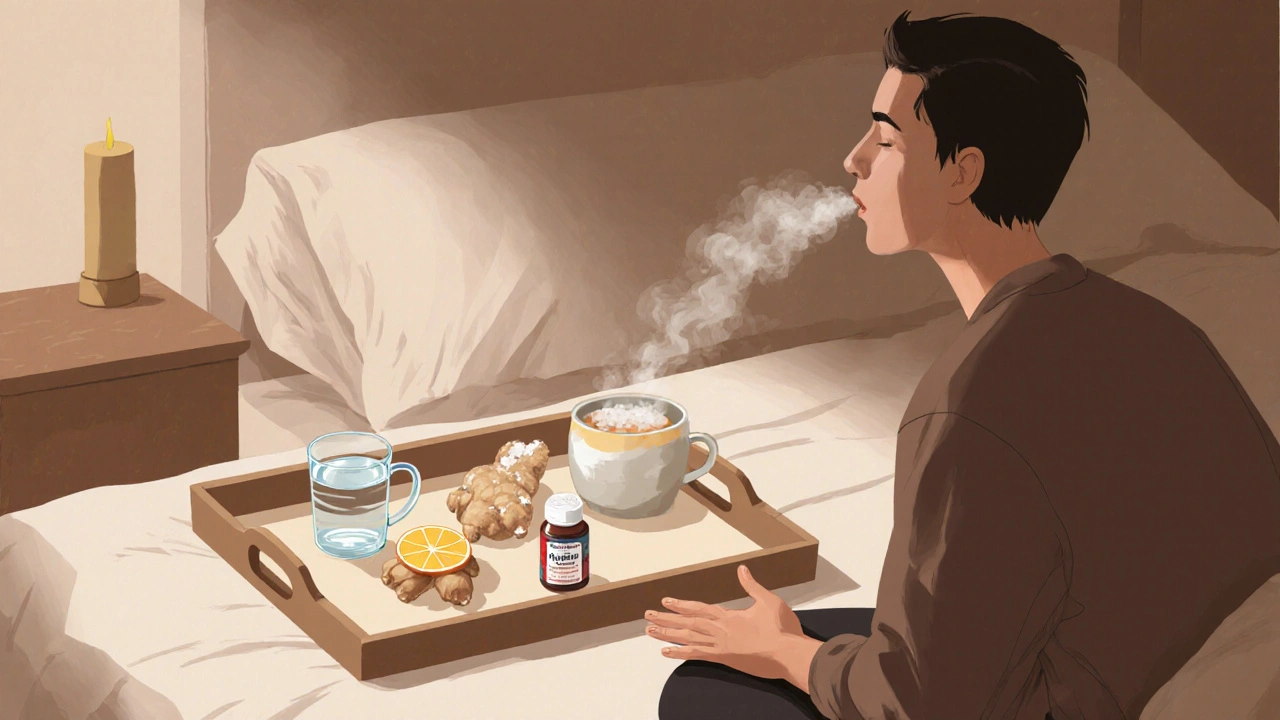Nausea Relief Strategy Calculator
Find Your Personal Nausea Relief Plan
Enter your main trigger and symptom severity to get tailored recommendations.
When Nausea is a sensation of queasy stomach that often leads to vomiting, it does more than just make you feel sick - it can hijack your whole night. Imagine lying in bed, heart racing, stomach flipping, and the clock ticking past 3am. That’s the reality for many people who struggle with nausea while trying to sleep. Below we break down why nausea messes with your rest, what triggers it at night, and a toolbox of real‑world tips to quiet the queasy feeling so you can finally drift off.
Why Nausea Messes With Your Sleep Cycle
Sleep isn’t a single block; it’s a series of stages that need to flow smoothly. Nausea interferes with this flow in three ways:
- Hormonal feedback: The body releases cortisol and adrenaline when you feel sick, both of which keep you alert.
- Physical discomfort: An upset stomach triggers the vagus nerve, which can cause sudden awakenings or lighter sleep.
- Breathing changes: Vomiting or the urge to vomit often forces shallow breathing, reducing oxygen intake and disrupting REM sleep.
When any of these happen, you’ll spend more time in light sleep (stage1 and2) and less in deep or REM phases, leaving you groggy the next morning.
Common Nighttime Nausea Triggers
Knowing the source is half the battle. Here are the most frequent culprits that flare up when the lights go out:
- Acid reflux (GERD): Lying flat lets stomach acid splash up the esophagus, causing burning and nausea.
- Pregnancy morning sickness: Hormonal shifts linger into the night for many expecting mothers.
- Medication side effects: Some painkillers, antibiotics, and antidepressants hit hardest after a full day’s dose.
- Stress and anxiety: Racing thoughts keep the gut in “fight‑or‑flight” mode, which translates into queasiness.
- Dehydration: Low fluid levels dry out gastric mucus, making the stomach more sensitive.

Quick‑Fix Strategies to Calm Nausea Before Bed
These moves take less than five minutes and can be done right in the bedroom:
- Sip a small glass of room‑temperature water with a pinch of sea salt - restores electrolytes without over‑filling the stomach.
- Chew a fresh ginger slice or sip ginger tea - studies show ginger reduces nausea in up to 70% of participants.
- Place a cool, damp cloth on the forehead - the slight temperature drop calms the vagus nerve.
- Practice a 30‑second diaphragmatic breathing exercise - inhale through the nose for four counts, exhale through the mouth for six.
- If you have an over‑the‑counter antiemetic (e.g., dimenhydrinate), take the recommended dose 30minutes before lying down, but only if you’ve used it safely before.
These tricks work best when you combine them with longer‑term sleep‑hygiene tweaks.
Sleep‑Hygiene Tweaks Tailored for Nausea
Standard sleep advice (dark room, cool temperature) still applies, but a few extra steps can make a big difference for queasy sleepers:
- Elevate the head: Use a wedge pillow or stack two regular pillows to keep the upper body at a 30‑degree angle. This reduces reflux and eases pressure on the stomach.
- Avoid heavy meals after 7pm: Aim for a light snack that’s low in fat and acid - think banana with a spoonful of almond butter.
- Limit liquids right before bed: Too much fluid can trigger a full stomach; keep it to a sipper.
- Set a “wind‑down” window: 30minutes of screen‑free, calming activities (reading, gentle stretching) lowers cortisol, which in turn eases the gut.
- Keep a “nausea kit” by the bedside: Include mint lozenges, ginger chews, a glass of water, and your chosen antiemetic.
Comparison Table: Triggers vs. Bedtime Adjustments
| Trigger | Adjustment | Why it helps |
|---|---|---|
| Acid reflux (GERD) | Elevate head 30° with a wedge pillow | Gravity keeps stomach acid where it belongs, reducing irritation. |
| Pregnancy morning sickness | Snack on plain crackers and sip ginger tea 60min before bed | Carbohydrate stabilizes blood sugar; ginger soothes the stomach lining. |
| Medication side effects | Take meds earlier in the evening; keep an antiemetic on hand | Allows the body to metabolize the drug before lying flat. |
| Stress/anxiety | 30‑second diaphragmatic breathing + screen‑free wind‑down | Activates parasympathetic nervous system, lowering gut motility spikes. |
| Dehydration | Sip electrolyted water (¼L) before bedtime | Restores stomach mucus barrier, reducing irritation. |

When to Seek Professional Help
If nausea persists despite these steps, it may be a sign of an underlying condition. Reach out to a healthcare provider if you notice any of the following:
- Vomiting more than three times in 24hours
- Blood in the vomit or a coffee‑ground appearance
- Weight loss exceeding 5% in a month
- Severe abdominal pain, fever, or dizziness
- Persistent symptoms lasting longer than two weeks
Telehealth services can connect you with a clinician from the comfort of your bedroom, and many health plans in Australia cover an initial virtual consult.
Putting It All Together: A Night‑time Action Plan
Here’s a simple checklist you can print and keep on your nightstand:
- Finish dinner by 7pm; choose a light, low‑fat snack if hungry later.
- Set up a wedge pillow or elevate the head of the bed.
- One hour before bed: sip ginger tea, chew a small piece of ginger, and hydrate with a glass of electrolyted water.
- 30minutes before lights‑out: turn off phones, dim the lights, and do a 30‑second breathing exercise.
- Keep your “nausea kit” (mint lozenges, antiemetic, water) within arm’s reach.
- If you feel queasy, use one quick‑fix (cool cloth, ginger slice) and then lie down.
- Monitor symptoms for a week; if no improvement, schedule a telehealth visit.
Following this routine consistently can turn a night of tossing and turning into a restful sleep, even when nausea tries to crash the party.
Frequently Asked Questions
Can drinking water make nausea worse at night?
A small sip of water helps calm the stomach, but drinking large volumes can over‑fill the stomach and increase reflux. Aim for a half‑cup of room‑temperature water with a pinch of salt if you’re thirsty before bed.
Is it safe to take over‑the‑counter antiemetics nightly?
Most OTC antiemetics, like dimenhydrinate, are labeled for short‑term use. If you need them for more than a few nights, talk to a doctor to rule out chronic causes and explore prescription options.
Why does lying flat make my stomach feel worse?
When you lie flat, gravity no longer keeps stomach contents down. Acid and partially digested food can flow back toward the esophagus, triggering the nausea reflex.
Can anxiety alone cause nighttime vomiting?
Intense anxiety can stimulate the vagus nerve, leading to a sensation of nausea that, in extreme cases, may progress to vomiting. Managing stress with breathing, meditation, or counseling often reduces the episodes.
What natural remedies work best for night‑time nausea?
Ginger (fresh, tea, or capsules) and peppermint (tea or lozenges) have the strongest evidence. Both calm the stomach lining and reduce the urge to vomit without sedation.
Should I avoid sleeping on my right side if I have reflux?
Yes. Sleeping on the left side keeps the stomach below the esophagus, which is the position recommended by gastroenterologists to lessen reflux‑related nausea.



Great rundown, the quick fixes are exactly what I needed.